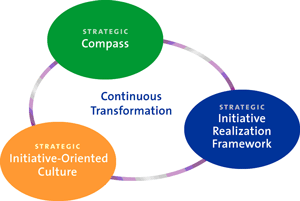Building an Initiative Oriented Culture
Today’s businesses are pushed and pulled in many directions. Strategy execution has been recognized as critical by leaders and organizations to give the edge and competitive advantage over competitors, and is needed even more in the turbulent times we face. And yet, statistics and results indicate that most organizations do not execute strategy successfully – in fact less than 34% of corporate strategy is ever executed and many initiatives fail to deliver the expected and necessary results. Common challenges include: introducing and managing change, rapidly changing landscapes and markets, and the effective use of human capital.
Role of Culture
One of the critical factors SPM has seen year over year while working with clients on their key strategic initiatives is the impact of culture. The right culture can overcome gaps in infrastructure and process. An adverse culture can sabotage even the best process and intent. In many instances culture is often skirted around than considered an important contributor to more effective strategy execution. We also see a very strong ‘tension zone’ between executing strategic initiatives and running the day-to-day business as usual operations (BAU). The ideal culture for ‘business as usual’ may be different than what is needed for initiative execution and can further exacerbate the tension zone between strategy execution and BAU. A recent study reported that 72% of executives indicate that a culture gaps exists within their organizations and is interfering with strategy execution and goal achievement. And as Connie Curran wrote ‘Culture will eat strategy for lunch every time’. All these factors point to the role of culture as a powerful component of an organization’s success, laying the foundation for productivity and progress.
In SPM’s Enabling the Effective Enterprise model an Initiative Oriented Culture is one of three key underpinnings. The diagram below shows the key components of an effective enterprise and how they interact in a continuous transformation cycle.

Developing an Optimal Culture
So what is culture and what is the optimal culture for an organization? By definition, culture is a set of stated and unstated, explicit and implicit beliefs and assumptions shared by a group. It is often invisible and unconsciously at work, yet ever present and lasting in its impact. Culture shapes and harmonizes behaviours of all members in the organization or group. There are generally three functions of culture in the workplace: simplification and adaptation of decisions, integration and affiliation, and member motivation and activation.
The culture components to consider in an initiative oriented environment are:
- Values: behaviours and attitudes have a powerful impact on the outcome by teams charged with strategy execution and include: leadership, empowerment, trust, risk tolerance, engagement and results orientation.
- Process: strong, repeatable processes that also address the risk inherent in temporary endeavours (such as initiatives, programs and projects) will play a critical role in strategy execution; best supporting processes should include: clarity and communications of strategy, knowledge sharing, change management, innovation, and organizational alignment.
- Structures: the environmental structure within which work is done for initiatives versus ‘business as usual’ is different and will be a key enabler to success. Key factors include: team structures, hhiring practices, alignment of reward and recognition systems, recognition and usage of change agents, and effective use of virtual teams.
Building awareness and deliberately designing culture appears to provide higher cohesion around priorities and establishes ownership for behaviours and beliefs that impact success, rather than leaving it to chance. Culture can accelerate getting to the next level of success or just as easily act as a drag. By recognizing the need to fit culture with strategy and in particular allow for culture to drive execution, organizations can target specific actions to build the culture needed for successful execution of strategy.
The optimal culture for one organization will not be the same for another. Each organization needs to recognize its own unique set of culture patterns, strengths and areas of collective practices that represents its culture. The strategy or combination of strategies for an organization will determine the best culture. For example, a cultural environment that supports a strategy of innovation may not be the same as one of a high reliability organization. Culture may need to change over time as strategies shift. The evolution of the organization and its maturity will also guide the development of optimal culture.
Enabler or Barrier?
At a recent conference SPM launched a national survey to examine culture as an enabler or barrier to strategy execution. 62% of the respondents indicated their organization does not have the right culture to allow for the effective implementation of strategy. Surprisingly comments indicated that most people feel culture is a positive factor, in other words an enabler rather than a barrier, despite the response to culture misfit with strategy. 58% indicated there have been attempts by their organization to change or alter culture deliberately. This demonstrates some level of understanding by leaders of the importance of culture. As Isadore Sharp states: ‘If you don’t understand the culture of the company, even your most brilliant strategies will fail. Your vision will be resisted, and all kinds of things will go wrong.’
The survey also tracked key indicators that impact strategic initiatives. Key positive cultural indicators included:
- 66% of respondents felt that they had leadership support for their initiatives and 71% felt that they were being motivated to succeed.
- Most respondents felt strongly that they understood how their work contributed to the overall strategy of the organization and also clearly understood priorities and expectations of them
Key negative cultural indicators:
- Only 33% of respondents indicated that they had learned from their past experience – success or failure
- Majority of respondents felt that they did not have the right mix of people on their team and that conflicting interests of team members interferred with success of initiatives
Conclusion
While the survey results show a certain level of awareness of the importance and positive impact culture can have on strategy execution there is still a need for more deliberate design and implementation of culture. Building an initiative oriented culture can create a much higher success rate on strategy execution. It must be deliberate, encourage an appreciation of culture strengths, rapidly focus on culture weaknesses, build cohesion around strategic priorities, and generate high performance results.
Catherine Daw, MBA, PMP is CEO and President of SPM Group Ltd. She provides the vision and leadership needed to evolve the firm including the current corporate direction to enabling the effective enterprise through strategic initiative management. Her focus is on results that matter to SPM’s clients and to ensure solutions exceed client expectations, save time and money, and help clients achieve superior business benefits. Catherine holds a Bachelor of Science degree in Mathematics and Computer Science from Queen’s University and a Masters of Business Administration from York University. She is an active member of the Project Management Institute and is a certified Project Management Professional (PMP) as designated by the Project Management Institute. Catherine can be reached at [email protected]
Ruchura Chatterjee, MA, PMP is a Senior Consultant with SPM Group Ltd. and has over twenty five years experience managing progressively larger and more complex departments and projects. She has held positions as Program Director, Director Client Services IT, Director Model Operations in a business unit, and managed Application Development and Business Systems functions. With a M.A in Economics from Calcutta University, India, Ruchira has also completed a Company sponsored Executive Management training program at Kellogg, Northwest University. She is a Project Management Professional (PMP) as certified by the Project Management Institute (PMI). Ruchura can be reached at [email protected]

penis prosthetic big penis big prosthetic big dildo erect penis prosthetic
… [Trackback]
[…] Information on that Topic: projecttimes.com/articles/building-an-initiative-oriented-culture/ […]
superkaya88
… [Trackback]
[…] Find More to that Topic: projecttimes.com/articles/building-an-initiative-oriented-culture/ […]
site here
… [Trackback]
[…] Find More to that Topic: projecttimes.com/articles/building-an-initiative-oriented-culture/ […]